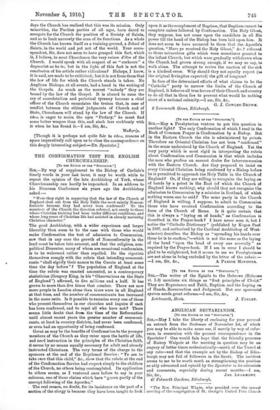[TO THE EIHTOE 07 THE " SPECS/TOL")
Sin,—May a Presbyterian venture to put this question in another light? The only Confirmation of which I read in the Book of Common Prayer is Confirmation by a Bishop. But in the Eastern Church the rite is administered by priests. Therefore an Oriental Christian has not been "confirmed" in the sense understood by the Church of England. Yet the very party which is most rigid in interpreting the rubric' about Confirmation and Communion is that which includes the men who profess an earnest desire for intercommunion with the Eastern Church. Are they prepared to insist on every Oriental Christian being confirmed by a Bishop before he is permitted to approach the Holy Table in the Church of England ? Or, if they are willing to recognise the laying on of hands by a priest in the East (of which the Church of England knows nothing), why should they not recognise the admission to Communion by a minister in Scotland, of which nothing worse can be said The same party in the Church of England is willing, I suppose, to admit to Communion those who have received Confirmation according to the form of the Church of Rome. Is it quite certain that this is always a "laying on of hands," as Confirmation is described in the Prayer-book ? I have never seen it, but I notice the "Catholic Dictionary" (published by Kegan Pant in 1897, and authorised by the Cardinal Archbishop of West- minster) describes the Bishop as "spreading his hands over those he is to confirm,"—which is not the same as the laying of the hand "upon the head of every one severally" as required by the Prayer-book. If I am in error I should be glad to be enlightened, but it seems to me we Presbyterians are not alone in being excluded by the letter of the rubric.—


































































 Previous page
Previous page